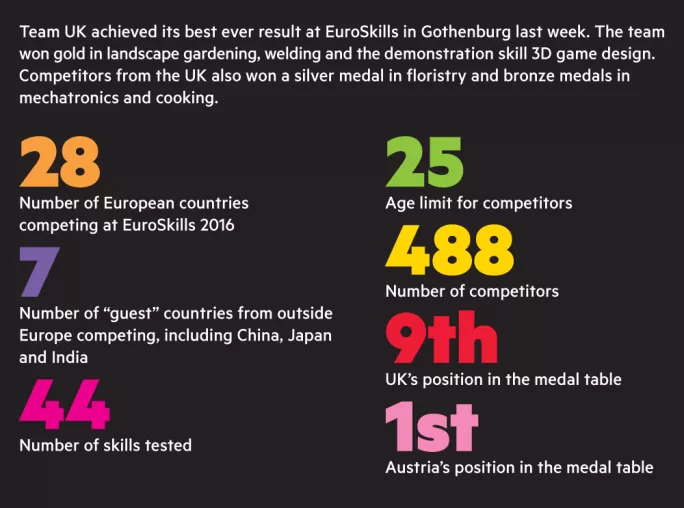Skills put Scotland on the map in international competitions

Colleges and their increasing focus on employability are at the heart of Scottish success at national and international skills competitions, experts have said.
The comments come after two Scottish colleges topped the league table at last month’s Skills Show - outperforming dozens of institutions from across the UK. And last weekend, two of their students held their own at the EuroSkills competition in Sweden.
New College Lanarkshire scooped 10 medals and came top of the medal table at the Skills Show, where more than 500 competitors across 61 disciplines tested their skills in front of tens of thousands of visitors. Lanarkshire students walked away with four golds, two silvers and four bronzes, as well as two highly commended awards.
City of Glasgow College won two golds, three silvers, two bronze and two highly commended awards.
‘Colleges carry all the weight - investing resource and releasing staff’
Third in the table was Welsh college Coleg Sir Gar, followed by Coleg Cambria, also in Wales, and South Eastern Regional College in Northern Ireland.
Neil Bentley, chief executive of WorldSkills UK, said that the success was as a result of investment by the participating colleges. The fact that colleges in Scotland had already gone through a regionalisation process also helped, putting them ahead of those in England, he added.
“They see the value in this,” Mr Bentley said. “There is an argument as well that the devolved nations have already gone through their equivalent of area reviews, they have come out the other end of reform, they have larger, more regionalised colleges and smaller economies. Their networks are more integrated, I think, and that helps.”
City of Glasgow College principal Paul Little, who is a member of the board at WorldSkills UK and lead champion for the organisation in Scotland, said: “The colleges in Scotland are much more employability focused. They also engage more with employers than the English ones do, and they offer a higher proportion of higher education. That has an impact because of the different staff and our links with industry.”

Confident performance
Mr Little spoke to TESS at EuroSkills in Gothenburg last weekend, where he was cheering on former City of Glasgow student Isla McLarty. One of two Scottish competitors at the event in Sweden, she won a medallion for excellence in beauty therapy.
Fellow Scot Betsy Crosbie, from New College Lanarkshire, was also awarded a medallion for excellence in mechanical engineering CAD (computer-aided design).
McLarty feels her competition success has given a boost to others on her college course. “I think it motivated some to do better,” she told TESS. “My college has a really high level of support. My lecturer who entered me two years ago is still training me now.”
Crosbie added: “I think it gives you confidence. You are given this really hard piece of work you have never seen before, and you finished that and got it done.”
The value of taking part in the competitions was clear, said Mr Little: “It takes students from competence to mastery.”
Unlike in other nations, Scottish colleges did not receive any support from their government to help them participate, he added. “At the moment, colleges carry all the weight - investing resource, releasing staff and supporting competitions.”
Barry Skea, the WorldSkills UK expert in mechanical engineering CAD and lecturer at New College Lanarkshire, said that it was the Scottish Qualifications Authority (SQA) system that gave Scots the advantage over further education students elsewhere.
“Staff have major input into the qualifications,” he added. “Where something has fallen behind, you can make adjustments to make sure the qualifications you are working towards are future-proof.”
Chris Brodie, the lead head for sector development at Skills Development Scotland, said: “Scotland’s success is down to the commitment of the colleges involved. The colleges have invested in getting the students to competition, in their training and in resource.”
You need a Tes subscription to read this article
Subscribe now to read this article and get other subscriber-only content:
- Unlimited access to all Tes magazine content
- Exclusive subscriber-only stories
- Award-winning email newsletters
Already a subscriber? Log in
You need a subscription to read this article
Subscribe now to read this article and get other subscriber-only content, including:
- Unlimited access to all Tes magazine content
- Exclusive subscriber-only stories
- Award-winning email newsletters